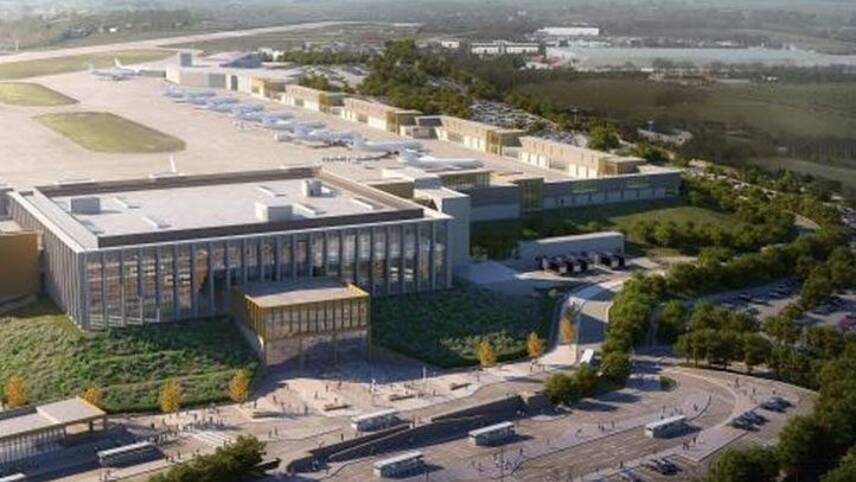Register for free and continue reading
Join our growing army of changemakers and get unlimited access to our premium content

Pictured: An artist's impression of the project. Image: Leeds Bradford Airport
The proposed expansion was granted planning permission earlier this month. While Councillors and MPs did question the environmental impact of the £150m project – especially given that Leeds City Council has a 2030 net-zero goal – they ultimately concluded that the Airport must update its 1960s terminal.
A statement from Leeds City Council reads: “Current government policy points to these emissions being something that should be primarily tackled at a national level – and addressed through international agreements and protocols – rather than by suppressing growth at individual airports in a way that could simply export passengers to other nearby airports at a higher financial cost to them and increase surface transport emissions.”
Green groups are now urging the UK’s Secretary of State for Housing, Communities and Local Government, Robert Jenrick, to use his powers to call in the decision on climate grounds. Civil servants in Whitehall have the authority to assess the full scope of local, national and international impacts of the project if the call is made.
Solicitor Estelle Dehon, representing the Group for Action on Leeds Bradford Airport, has told Jenrick that the expansion “would commit the UK to decades of increased carbon emissions, against the Climate Change Committee’s advice”. The CCC has recommended that the UK’s Sixth Carbon Budget be designed to deliver a 78% reduction in emissions by 2035, against a 1990 baseline. It has called for a cap on the aviation sector’s expansion to meet this goal.
“As with the proposed Cumbrian coalmine, allowing this in the year we host COP26 undermines the UK’s ambition to lead on the climate crisis,” Dehon added. Jenrick notably decided not to call in the coking coal project in Cumbria – but, after weeks of pressure, Cumbria County Council is reconsidering the proposals itself to better account for the CCC’s recommendations.
Organisations including the New Economics Foundation and Greenpeace are supporting the Group for Action on Leeds Bradford Airport. Greenpeace UK senior campaigner Ariana Densham said that the expansion will be a “local decision with global consequences” in regards to climate.
Some Councillors and MPs have continued to vocally criticise the decision since planning permission was granted two weeks ago. Wakefield Council’s deputy leader, Cllr Jack Hemmingway, has said that the project would be a “disaster” for both local, national and international climate action, and for the local economy. While proponents of the project have pointed to its economic potential, New Economics Foundation analysis revealed that the developers have not factored in the economic drain of travellers holidaying abroad rather than in the UK.
Leeds Bradford Airport has maintained that its proposals are “compliant with local, national planning policy and national aviation policy.”
The Department for Local Communities and Government has told media representatives that it is aware of the calls to action, but will not make a decision on calling in the project until the Council grants final approval.
Ready for take-off?
The news from Leeds Bradford Airport comes after the Supreme Court decided to allow the Heathrow Airport expansion, despite the fact that the Court of Appeal ruled it unlawful on climate grounds in early 2020.
When the Court of Appeal made its decision, the UK Government said it would not challenge. But the corporate owner of the Airport has done so successfully.
The expansion, centred around a third runway, would see Heathrow Airport go from overseeing 480,000 takeoffs and landings each year to around 740,000. It would not be completed until 2030.
Lawyers at Plan B Earth have said they will continue to argue the case to block the plans, while Heathrow Airport has said it will continue progressing the case for expansion.
Aside from Heathrow and Leeds Bradford, Stanstead, Southampton and Bristol airports are all eyeing expansions.
Airbus emissions
In related news, Airbus has this week disclosed the full extent of its Scope 3 (indirect) emissions for the first time.
The firm’s documents outlining full-year results for the 2020 financial year reveal that aircraft sold during the period will produce more than one billion tonnes of CO2e during their lifetimes. The firm sold 863 planes in 2019 and 566 in 2020.
An Airbus representative told The Guardian that the firm has worked to reduce the emissions intensity of its products and seen better sales of more efficient planes, even amid the pandemic. She also stipulated that the company is developing a “roadmap” to decarbonisation.
Sarah George


Please login or Register to leave a comment.